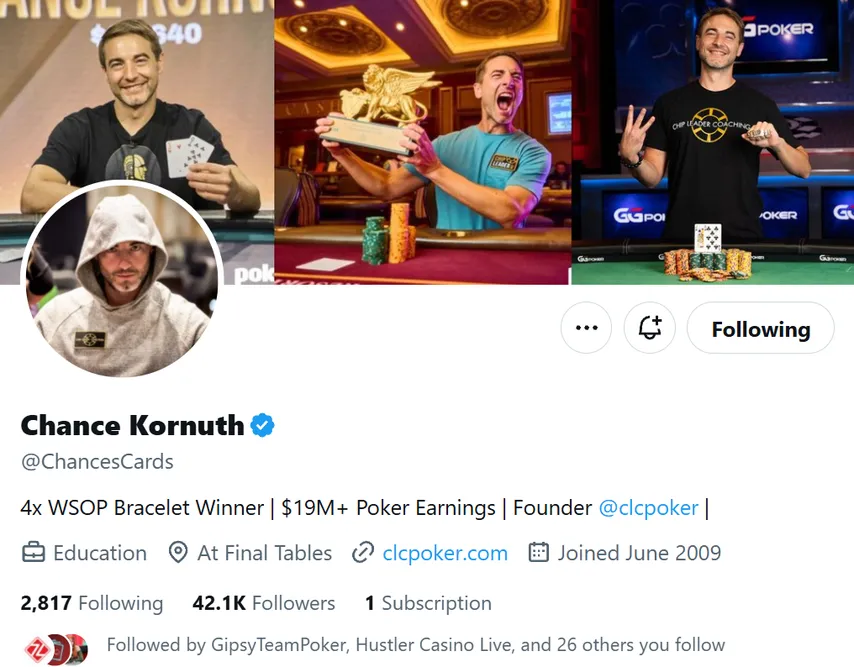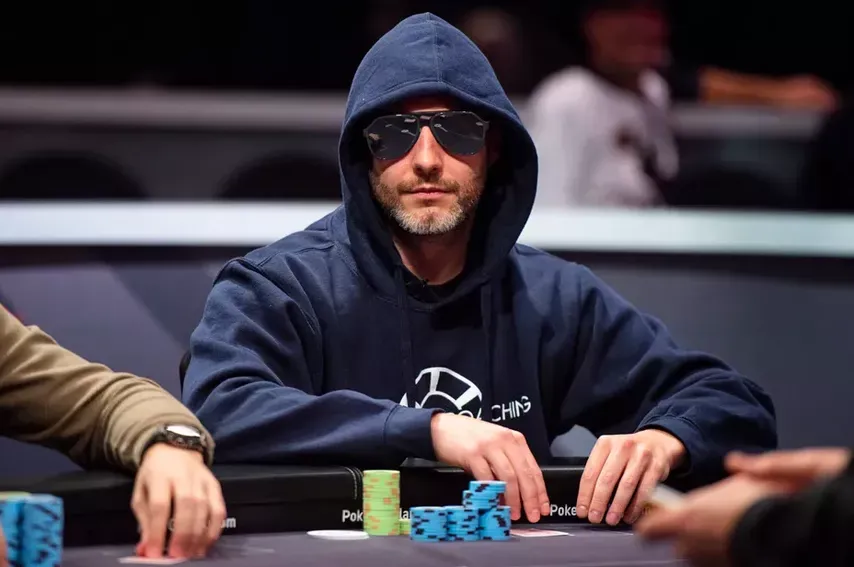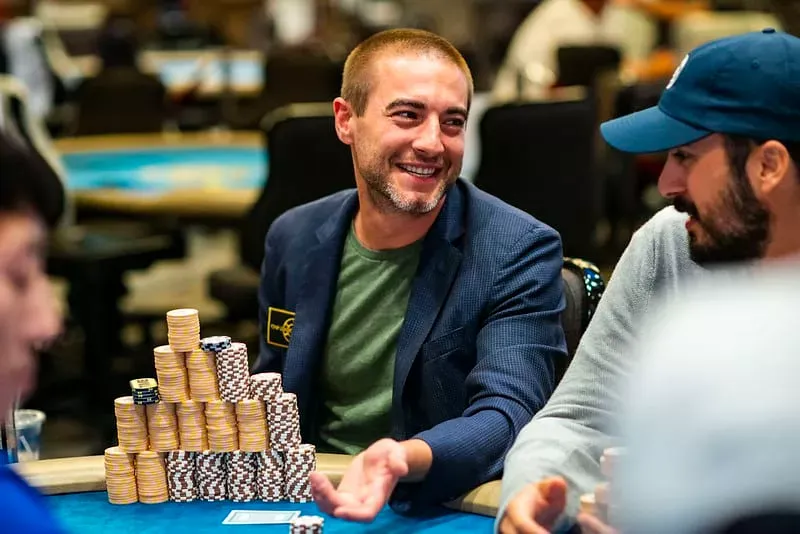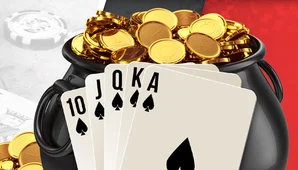Chance Kornuth is one of the most media-friendly tournament players, with 42,000 followers on Twitter. And he runs his Twitter like a king and the vast majority of his posts are ready-made aphorisms.

We threw some of these tweets into poker and mindset categories, so you can find the Chance-wisdom you need quicker.
Poker Advice from Chance Kornuth
- The poker session where everything goes wrong is teaching you more about your actual skill level than you care to admit.
- Your poker decisions should be based on ranges and probabilities, not on what you hope your opponent has.
- Your opponents' mistakes don't justify your own. Play optimal poker regardless of how terribly everyone else is playing.
- Your poker decisions reveal whether you're playing to win money or playing to feel cool. One of these approaches is a lot more profitable.
- The best poker players don't see bad beats as unfair events. They see them as punishment for suboptimal decision-making.
- The chips you don't lose are often more valuable than the chips you win. Defense wins championships.
- The poker player who takes down the pot after betting big and says "I never bluff" is telling you exactly how to play against them. If you know, you know.
- Poker tournaments are a sequence of increasingly expensive decisions. The wining players make fewer expensive mistakes.
- Tournament players who complain about "variance" in late stages don't understand navigating early or middle stages.
- If you can't explain your poker strategy to a beginner, you don't understand it well enough to execute it against professionals.
- You don't win by being the most aggressive player at the table. You win by being the most adaptable.
- If you're not tracking your results, you're not serious about poker. You can't improve what you don't measure.
- Your poker bankroll isn't just money. It's your ability to make rational decisions under pressure. Protect it accordingly.
- There's no shame in being outplayed. The shame is in not having an answer and adjustment ready to go.
- Being card dead isn't the problem. Not understanding table dynamics, emotional thresholds, and live tells is the problem.
- Poker is easy. Just make sure to lose the minimum when you're behind and win the maximum when you're ahead.
- Most poker players could double their win rate without learning a single new strategy—just by eliminating their three biggest leaks.
- The money you save by not punting when you're tilted, tired, or unfocused is often more valuable than the money you make playing your A-game.
- Poker players want to learn all the fancy exploits against specific player types but can't focus at the table for more than 30 minutes.
- Tournament players who min-cash but never make final tables aren't unlucky. They've just just optimized their strategy for surviving instead of winning.

Mindset Advice from Chance Kornuth
- Poker players will study range charts for hours but won't spend 10 minutes analyzing their own psychological leaks.
- Your improvement is directly proportional to your willingness to be wrong about things you currently believe to be true.
- Players who constantly seek validation for their plays care more about being liked than being profitable. Pick one.
- Your poker game will change once you stop caring about looking stupid.
- Most poker players know what they should do but lack the emotional discipline to do it consistently. Work on your mind, not just your strategy.
- Your poker mindset should be: ruthless with analysis, patient with execution, and detached from results.
- Most poker players quit right before a breakthrough because improvement can feel like regression when you're learning new concepts.
- Most poker players would rather lose with a "standard" play than win with an "unconventional" one. This fear of judgment keeps them mediocre.
- Your poker edge isn't permanent. It expires the moment you stop working to maintain it while your opponents keep improving.
- Most poker mistakes aren't about "not knowing" what to do. They're about knowing what to do but lacking the discipline to do it consistently.
- Any aspiring poker player saying "I don't study because I'm a feel player" is like a surgeon saying "I don't need medical school because I have good hands."
- Your improvement is limited by the quality of feedback you're willing to accept. Harsh truths > comforting lies.
- Most poker players fail because they optimize for short-term comfort instead of long-term growth. Discomfort is the price of mastery.
- Preparation before playing poker matters way more than you think.
- The moment you start playing to prove something to someone else is the moment you stop making optimal decisions for yourself.
- Progress in poker isn't a straight line. You'll have breakthroughs followed by setbacks, clarity followed by confusion. Keep going.
- The longer you play poker, the more you realize it's not about being the smartest person at the table. It's about being the most self-aware.
- The most dangerous time in a poker player's career isn't when they're losing. It's right after their first big win.
- The most important skill at low stakes isn't recognizing when opponents are bluffing. It's recognizing when you're lying to yourself about them bluffing.
- There are no shortcuts to poker success. Just a long road paved with mistakes that you're either learning from or repeating.


100% first deposit bonus up to $1,000
Indefinite

Bonus 100% on first deposit up to $2,000
Indefinite
Here's the reaction of one of Chance's fans, which summed up how it feels after scrolling through dozens of his tweets.
🤣 well played https://t.co/XBLxIEo8Kv
— Chance Kornuth (@ChancesCards) June 24, 2025


















